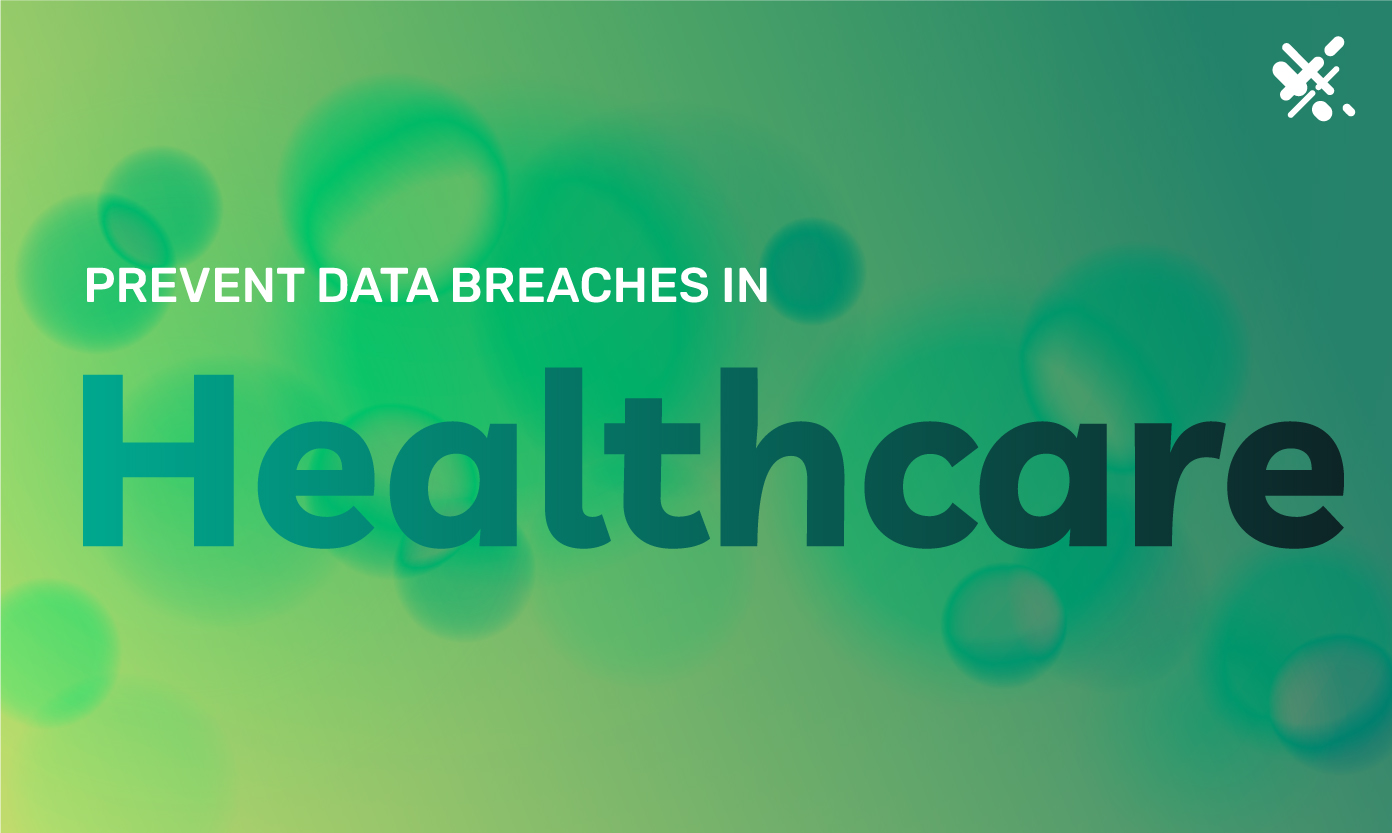Over the last 15 years, nearly 360 million medical records have been compromised. It is essential to understand the significance of privacy breaches in healthcare, why they happen, and how you can prevent data breaches. The more we learn, the more there is to share with others. Here, we have created a list of ten ways to prevent a healthcare data breach.
Technology and The Rise of Cybercrime
It’s no surprise that technology continues to progress in every industry. As a result, crime is also transitioning to the digital world. Cybercriminals can hack into online systems, steal sensitive data, and turn a profit from it either through blackmail or on the black market.
Unfortunately, it is unlikely that the rise of cybercrime will slow down. According to recent studies, over the last ten years, malware infections have significantly grown from nearly 29 million to 677.66 million. In fact, both large enterprises and small businesses suffer from cyber-attacks every 39 seconds.
Why Do Cyber Criminals Target the Healthcare Industry?
Among large and small businesses lies the healthcare industry. A market that cyber criminals surely have not overlooked. In 2023, the United States alone had 395 breaches reported. These compromised security incidents have affected the records of 59,569,604 individuals.
Any business within the healthcare industry, such as health clinics, hospitals, pharmaceutical companies, and insurance companies, is a prime target for cybercriminals. Unlike traditional business data breaches, healthcare facilities carry more than client financial information. They also hold sensitive medical information and personal identifiable information such as social security numbers.
Cybercriminals can use this data to initiate identity theft or even as leverage to extort money from healthcare facilities desperate to maintain trust from patients with their electronically protected health information (PHI).
Gaining access to individually identifiable health information is like winning the lottery for cybercriminals because buyers pay hundreds or even thousands of dollars for electronic medical records (EMRs) or electronic health records (EHRs) on the black market.
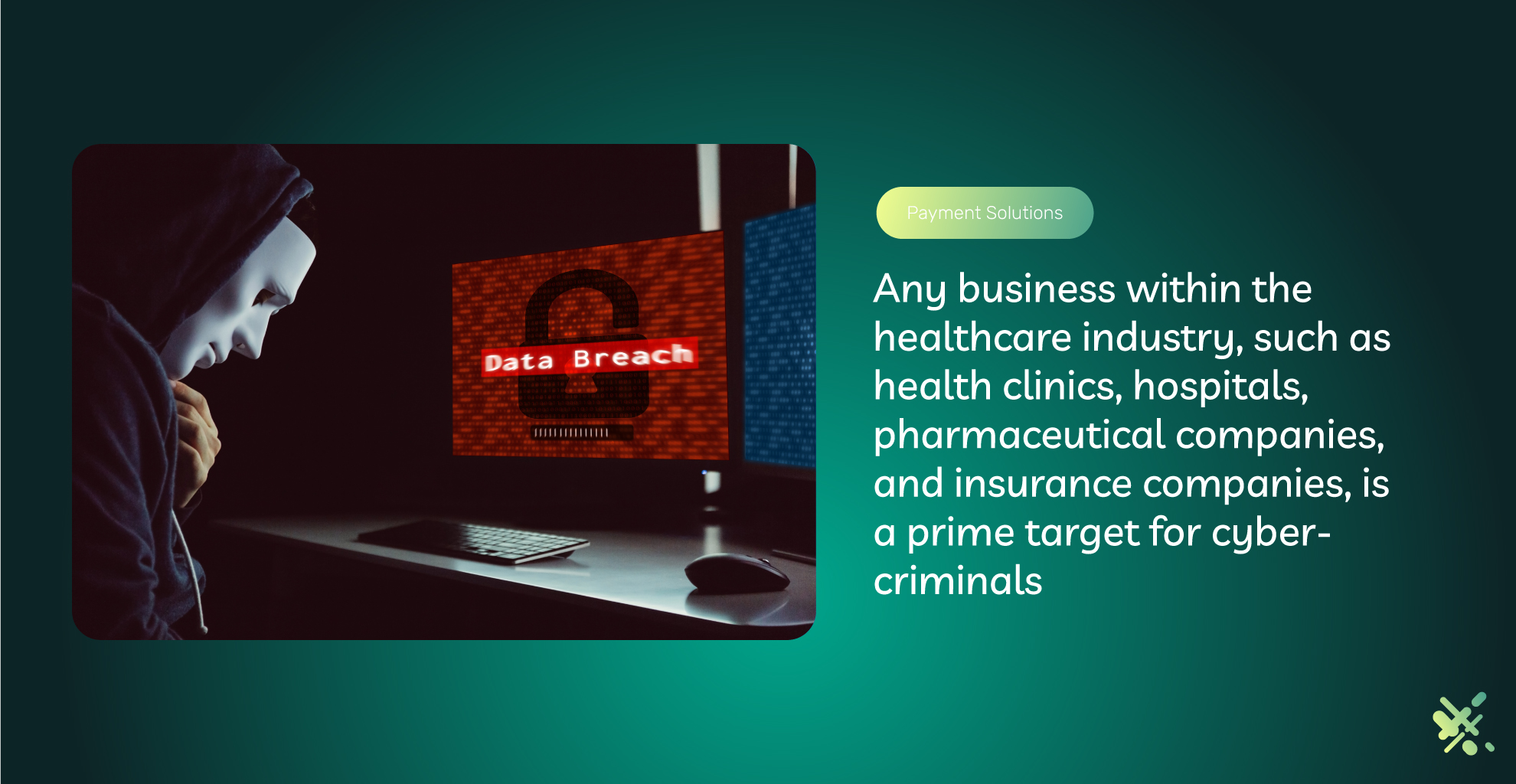
What Are The Consequences of Data Breaches in Healthcare?
The industry maintains strict data regulations. As a result, there are many negative consequences from data breaches in Healthcare. Should medical facilities face any type of security violation, they may suffer financially, criminally, and more.
HIPAA Covered entities
Penalties for noncompliance with HIPAA regulations are applicable to covered entities (CE) such as:
- Health care providers
- Health insurance agencies
- Health care clearinghouses
- Medicare prescription card sponsors
Under HIPAA regulations, in accordance with “corporate criminal liability,” individuals under the covered entity, such as managers and employees, may be held liable.
Civil Penalties
The U.S. Department of Health and Human Services Office for Civil Rights (HHS OCR) enforces fines relating to violations of the American Health Insurance Portability and Accountability Act (HIPAA) from $100 to $50,000 per incident. The gravity of violation determines where on this scale the final fine lands.
OCR will enforce the Privacy and Security Rules in several ways. First, they will investigate filed complaints. Then, they will conduct reviews to determine if covered entities are compliant. From there, OCR may determine that the covered entity was not in violation of the Privacy and Security Rules.
However, should they find that the covered entity was in violation of compliance regulations, OCR must try to resolve the case with the HIPAA covered entity through voluntary compliance adjustments, corrective action, or even a resolution agreement.
The federal government has the ability to make an overruling decision to reduce a facility’s fine if it’s excessive compared to the violation or forgo a fine entirely. It can also choose to compromise on the consequence, which typically involves a corrective action plan to rectify the Offense, which can still involve some sort of financial arrangement.
Fines Based on The Gravity of the Situation
- Reasonable Cause Penalty range: $1,000 – $50,000 per incident, with an yearly maximum of $100,000 for repeat incidents
- Willful Neglect (but the incident is corrected within the required time frame) Penalty range: $10,000 – $50,000 per violation, with a yearly maximum of $250,000 for repeat incidents
- Willful Neglect (and the incident is not corrected within the required time frame) Penalty range: $50,000 per incident, with a yearly maximum of $1,500,000 for repeat incidents.
HIPAA contains a list of factors that the federal government considers to determine the penalty amount. The Code of Federal Regulations lists these factors such as:
- The size of the facility
- The financial condition of the medical facility
- The number of affected individuals
- The facility’s history of compliance or noncompliance
- Whether the penalty would jeopardize the facility’s ability to continue to provide care
- If the breach caused financial, physical, or reputational harm or hindered the ability of a patient to obtain healthcare
- Unknowing Penalty range: $100 – $50,000 per incident, with an annual maximum of $25,000 for repeat incidents.
Criminal Penalties
Additionally, a HIPAA violation can result in criminal penalties enforced by The Department of Justice under the Privacy Rule. As we had discussed with civil penalties, criminal violations of HIPAA regulations have different levels of severity.
An individual in violation of the HIPAA Privacy Rules who knowingly acquires or exposes individually identifiable health information may face up to one year in prison and a criminal fine of up to $50,000.
If the violation involves false pretenses, the penalties increase to up to a five-year prison sentence and a $100,000 criminal fine.
Finally, if the violation involves the intent to sell, transfer, or use the health information for a business benefit, individual profit, or intentional damage, the penalty once again increases to up to a decade sentence in prison and a $250,000 fine.
Long-term Effects
The consequences of HIPAA violations and data breaches extend beyond fines and prison time. When medical facilities are responsible for compromised personal information, they may have to provide identity monitoring and invest financial resources into potential lawsuits from victims of data breaches.
However, one of the biggest losses from a data breach in healthcare is the compromised reputation of a healthcare provider. Not only will the affected patient find a new provider, but if the data breach becomes well-known, other patients may look for a new practice where they feel their protected health information will actually be… protected. Furthermore, business partnerships may also be affected.
The loss of trust and lack of patients results in the need for health institutions to spend more financial investment on increasing their cybersecurity efforts and advertising these efforts to regain the trust of patients.
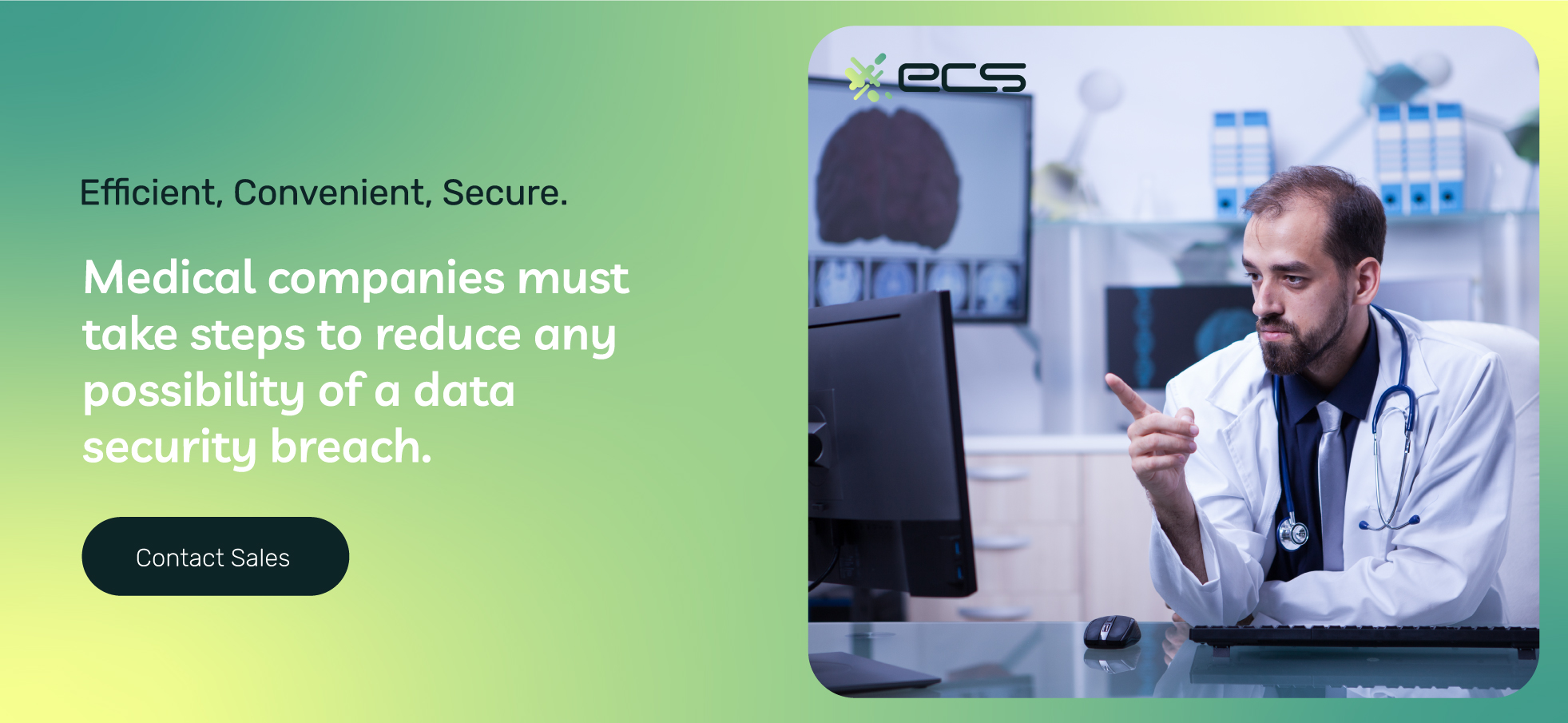
Best Practices to Prevent Data Breaches in Healthcare
Thankfully, there are many ways your healthcare facility can prevent these types of consequences. Though some of these best practices to prevent a data breach in healthcare require investing time, effort, and funds, it is far less costly than dealing with the negative impacts of a healthcare privacy breach.
Medical companies must take steps to reduce any possibility of a data security breach. Because of this, we have prepared 11 breach prevention best practices in healthcare.
1. Employ Security and IT Experts
It’s obvious that operating a healthcare business is impossible without well-trained physicians and nurses. The same is true for operating a secure facility with quality security and IT employees. Your security measures are only as strong as those who manage them.
2. Conduct Annual Security and IT Infrastructure Analysis
Just as you would recommend regular checkups for patients, the HIPAA Security Rules require regular risk analysis to assess your vulnerabilities and areas of improvement to avoid a data breach in your healthcare facility. You should scan your entire system, including any smart technologies.
3. Update Your IT Infrastructure
If, after completing steps one and two, your analysis concludes that you need to update certain systems, step three comes in.
When devices and systems become outdated, their manufacturers may no longer provide adequate support. With inadequate support, these systems no longer support newly released updates to protect against security threats and eliminate new malware.
To prevent healthcare data breaches, always be sure to prioritize updating or replacing outdated equipment and software to maintain the highest level of security.
4. Limit Levels of Access to Patient Information
Not every employee in your healthcare facility has to have access to patient health records, such as volunteers, security, and third-party partners. You must limit the staff who can view certain EHR/EMRs. Users should only have access to patient healthcare data related to their position. Only those who work directly with the patient should have full access.
Role-based access provides only the needed information to certain users and limits options of what they can do with data, such as view only, view and export, or add, delete, or modify information. Restricting access to patient records and properly managing user permissions are essential in preventing data breaches in healthcare.
5. Divide Your Wireless Networks
The most secure way to offer both patients and visitors internet access without access to your facility’s entire private network is to create a subnetwork. Your staff and medical devices can have access to sensitive patient data with access to a secure network, while restricted personnel only have access to a guest Wi-Fi.
6. Implement Electronic Device Policies
Modern health technology has made it possible to access electronic patient records from any smart device. This feature is extremely useful and can help speed up results and information acquisition in healthcare.
However, access like this does pose an additional risk, as controlling personal devices is a bit more difficult than managing company-issued devices. However, it is possible to have both remote access and security.
So, how do you avoid data breaches in healthcare while allowing personal device access to EHR/EMRs? First, you must create a policy. State:
- what kind of devices employees can use inside and outside of the hospital to access patient records
- if employees can bring company-issued devices home
- if employees can connect personal devices to your internal network
- what employees can do with that information
- what levels of access employees will have
- and install security walls to your facility’s staff website or application.
Additionally, educate employees that they are never to leave company-issued devices unlocked and unattended. Train staff on the safety procedures for logging on and off shared and even personal devices.
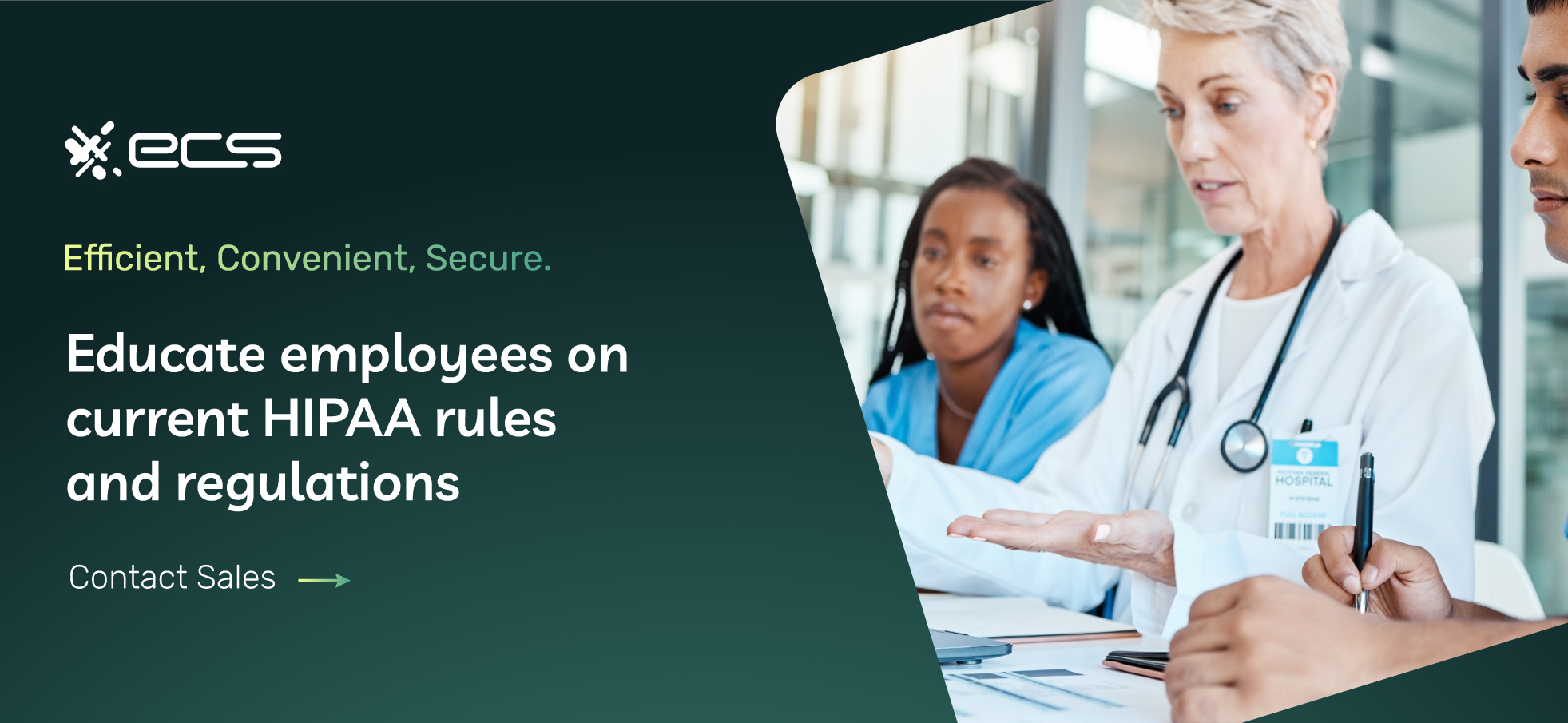

7. Educate and Train Your Employees
Personal devices and weak security are not the only reasons a breach might take place. Employees can become the cause of the breach through human error. Health personnel, generally speaking, are not IT or security experts.
Of course, this is understandable as they went to school to become nurses, doctors, or other vital parts of the healthcare team, not cybersecurity experts.
Because of this, you must ensure that you educate employees on current HIPAA rules and regulations and that cybersecurity training is easily accessible to everyone so that they fully understand the implications and consequences of a healthcare data breach.
Train your healthcare staff about the following to reduce the possibility of an accidental data security breach:
- Never leave devices or health records open, unattended, and easily accessible.
- Look out for email or text phishing scams. Explain how these scams work, how to detect them, ways to prevent them, and what to do if they believe their devices have been compromised.
- Keep all passwords secure. Never write down passwords where someone else can access them. And do not keep all passwords in one place.
- Never use public Wi-Fi while accessing patient health records or any work-related documents.
- Use caution with external hard drives, USBs, and CDs.
Be sure to closely monitor, manage, assess, and test employee knowledge of security rules within your facility, even after training.
8. Encrypt Sensitive Data
Always encrypt sensitive data. This security measure is powerful in safeguarding sensitive information from potential data breaches and ensures confidentiality during transmission or storage.
Data encryption is the process of transforming original information into an indecipherable code, which makes it impossible for unauthorized users to read its contents. To unlock and restore the information to a readable form, a user must have the digital decryption key to unlock the protected information.
9. Choose Your Third-Party Partners Wisely
You may have the best security team, you may update all your systems regularly, and you may educate your staff immaculately. Still, it can all be in vain if you share sensitive information with third parties that do not follow security guidelines.
To avoid this, ensure that your partners, such as outside billing companies, pharmacies, and specialists, handle information responsibly, follow HIPAA regulations, and have robust security measures in place.
10.Have a Response Plan
It’s understandably challenging to stay up-to-date on new types of cyber threats. Therefore, it’s important to not only focus on preventing data breaches in healthcare but also to be prepared to respond to them, should they arise.
Your medical facility should be able to detect threats, promptly shut down systems in case they have been compromised, discard affected digital files, safely preserve all remaining data, and obtain all relevant information about the data breach.
11. Invest in a Solid Legal Team
Last, should your medical practice become a victim of a data breach, even after implementing all the best practices explained above, you will need to reach out to your appointed legal team.
Legal teams can help you navigate the best course of action, protect your business, and even create a public incident communication plan to release. Transparent communication is key to help maintain some trust with your clients and business partners. However, a legal team can help to create the best advisable way to expose the incident.
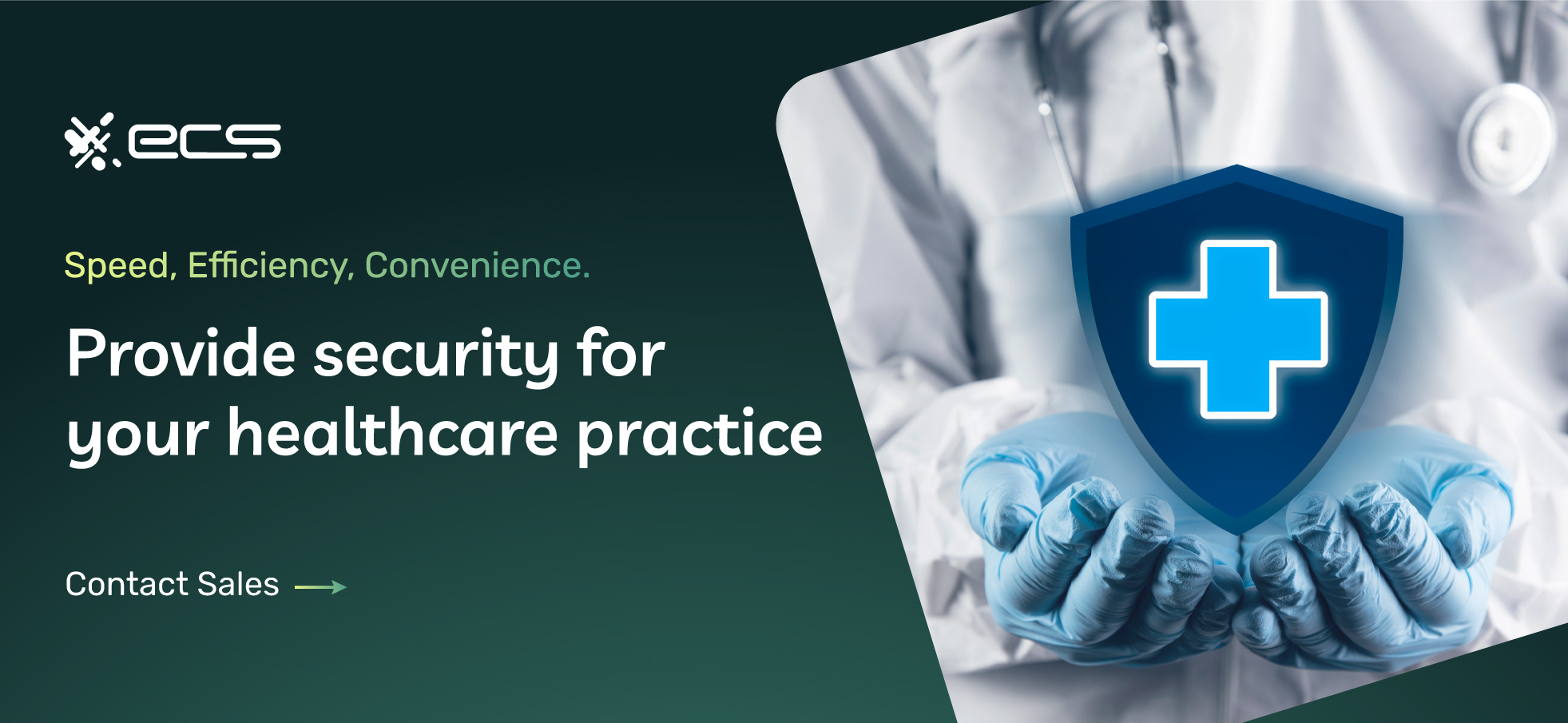
How ECS Can Provide Security For Your Healthcare Practice
ECS Payments is an expert in payment processing for healthcare practices. We provide speed, efficiency, convenience, and transaction security with our virtual terminals and contactless payment solutions. All of ECS’s credit card terminals are designed with contactless payment features that give your patients the flexibility to pay with their mobile wallets and highly secure EMV-enabled cards.
We also work hard to ensure that you are in compliance with PCI DSS regulations and aren’t subject to penalty fees. This includes online tokenization and data encryption. We also pride ourselves on our in-house risk team that will monitor transactions and stop fraudulent transactions before they become a detriment to your business.
So not only will your facility practice safe electronic health and medical record storage and transfer, but also secure patient payments, creating an environment your patients can trust.
ECS Payment’s Cutting-edge Payment Processing For Healthcare Businesses
Our innovative payment processing solutions are specifically designed to cater to a variety of unique and progressive medical industry experiences. With our virtual and physical terminal options, you will be able to accept all credit card and debit card networks, HSA cards, and even ACH payments with ease and top-of-the-line security measures at check-in, check-out, or online from the comfort of a patient’s home.
ECS Payments’ automated recurring billing features on our virtual terminal can streamline your healthcare practice business operations and reduce patient responsibility. You will receive payment more efficiently from patients and insurance companies with our seamless integrations.
Preventing Data Breaches in Healthcare Wrap-Up
Data breaches in healthcare are more common than anyone would like to admit. They pose significant loss in both finances and practice reputation. Because of this, it is important to safeguard your medical facility by implementing best practices.
You can prevent data breaches in healthcare by employing security and IT experts, conducting annual infrastructure analysis, updating outdated systems, limiting information access, dividing wireless networks, implementing and educating staff on device policies, encrypting data, and choosing responsible third-party partners.
Lastly, it’s important to understand that even if everyone at your facility follows best practices, sometimes data breaches in healthcare still happen. It’s best to be prepared with how you will respond if your practice does become a victim.
Frequently Asked Questions
Both large and small businesses (in and outside of the healthcare industry) suffer from cyber-attacks every 39 seconds. However, nearly 360 million health records have been compromised over the last 15 years. But in the last year alone, the United States had 395 reported breaches that compromised the records of 59,569,604 individuals.
To prevent the possibility of a data breach, you need to leverage IT experts to conduct a security risk analysis, update IT infrastructure, encrypt data, educate staff on best practices, limit access to patient data, monitor all devices, implement security policies, and work with trusted partners.
Data breaches in healthcare can occur through advanced technology in cybercrime through email phishing, ransomware, and malware attacks, vulnerabilities in hardware and software systems, or simply through human error and unsecured practices. Unsecured practices make it easy for anyone to gain access to sensitive data, whether they are expert cybercriminals or not.
ECS is dedicated to our merchant relationships. We have decades of experience in servicing the healthcare industry with secure patient payments and facilitating multiple ways to pay in-person and online.
Our product diversity can accommodate any payment need for any size healthcare business, whether an independent office, a small business, or a large corporation. With the strength of our industry-leading partners, we focus on changes within the health industry to deliver the most advanced payment products for low and high-risk merchants.
